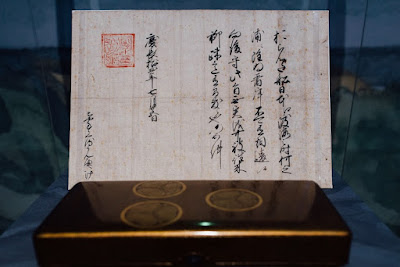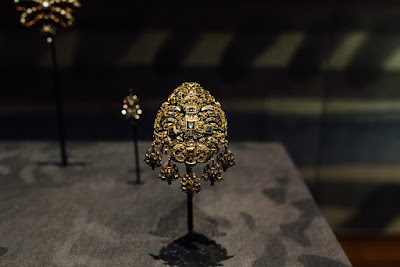| The Return to Amsterdam of the Second Expedition to the East Indies. Hendrik Cornelisz Vroom, 1599. |
The exhibition Asia in Amsterdam: Luxury in the Golden Age demonstrates the grandeur of Amsterdam and its elite during this period.
The Dutch East India Shipping Company (VOC) filled Dutch homes with treasures from Asian settlements. Porcelain, diamonds, spices and silks. From locations such as Sri Lanka, Malaysia, China, Japan and of course Indonesia.
The influx of these new goods was overwhelming. Local artisans were influenced by these new goods. They adopted Asian techniques and styles creating works of art that today are considered icons of Dutchness. Delft Blue porcelain is the obvious example.
The volume of goods from trading merchants of the East attracted an influx of immigrants from surrounding European countries. Knowledge and experience accumulated. Advancements were made particularly in ship building and cartography. Amsterdam became the place to go in Europe for Asian goods.
This exhibition displays imported Asian luxury goods along side local art. Demonstrating the the clear influence the Asian works had on Dutch life and art during the 17th and 18th Centuries.
What the exhibition is missing is artifacts or stories of the normal sailor, trade worker or prostitute. An acknowledgement of the vast number of people associated with this trade that did not possess these luxury items.
It is the National Museum of the Netherlands but in this time of austerity an exhibition of luxury and grandeur would have greater impact with a tale or two of those that did fully enjoy these treasures from the other side of the world.
Nonetheless, a worthwhile exhibition to visit. Our favorite pieces of the exhibition are below.
Letter of safe conduct with its original box. Japan 1609.
This letter was one of four issued by the military leader of Japan (Shogun) to the most important member of the Dutch trade delegation. The Dutch were the only European country to trade with the the Japanese for almost 200 years. This relationship can be seen today with Dutch influence in the Japanese language and pieces of Van Gogh's art.
Breast Ornament, c.1630 gold, diamonds, enamel.
Rough, uncut diamonds found their way to Amsterdam. Amsterdam became the center of Europe's diamond industry surpassing Antwerp. During the 17th century diamonds could only be found in Asia.
Plate, Japan, c. 1680 - 1700
This plate with the monogram of the VOC (Dutch East Indies Company) was made in Japan. Europeans knew little of the making process in the early 1600s. The process would be learned and perfected to become an icon of the country today, Delft Blue porcelain.
The exhibition Asia in Amsterdam: Luxury in the Golden Age runs until January 17, 2016.
Details to plan your visit can be at the website of the Rijksmuseum
When in Amsterdam...enjoy!
Related post:
Rijjksmuseum looks to ban photos
Rijksmuseum critics: What you need to know before you visit




No comments:
Post a Comment